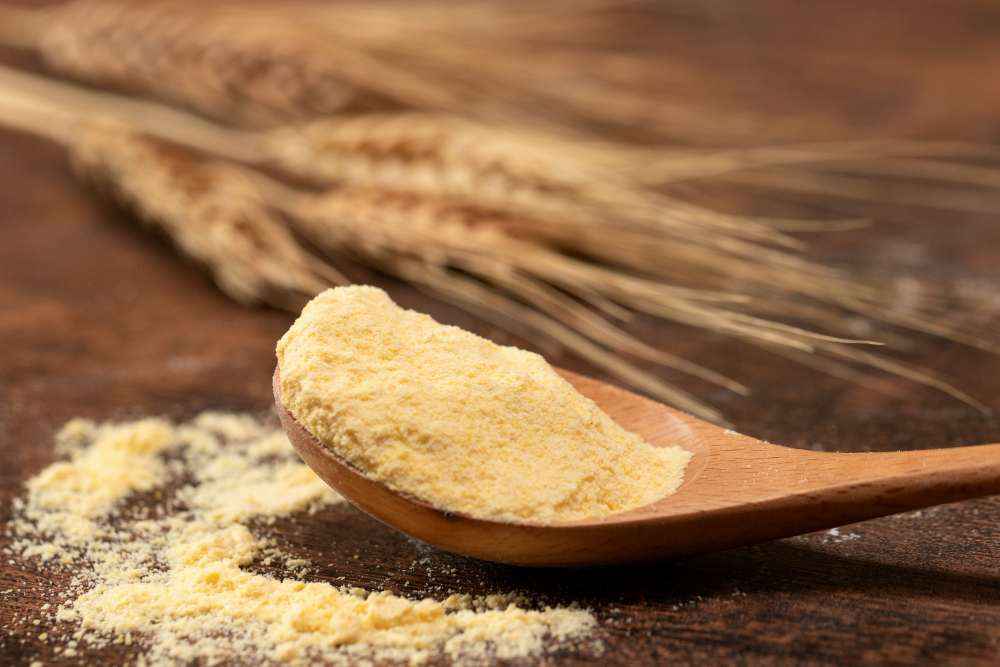Is Suji Good For Your Health? Know The Facts!

Medically Reviewed By
Prof. Ashok Rattan
Written By Muskan Taneja
on Nov 18, 2024
Last Edit Made By Muskan Taneja
on Jul 19, 2025

Suji or semolina can be ground from durum wheat. It is a popular type of wheat that is used all over the world. People across the globe use suji to prepare bread, pasta, and porridge. Experts say suji provides several benefits. But is Suji good for your health?
Indians commonly use suji to prepare breakfast or sweets such as rava kesari and halwa. Suji is off-white in color, and it is popular with different names in different languages worldwide.
| Language | Name |
| Italian | Semola di grano duro; coarse (no descriptor), fine rimacinata |
| Greek | simigdáli σιμιγδάλι; coarse chondró χονδρό, fine psiló ψιλό |
| Arabic | Samid, coarse kasim, fine na’im. |
| Turkish | Irmik, coarse iri, fine ince |
| Pakistani | Sooji |
| Hindustani | Basmi rava, bansi rava |
With so many names and pronunciations, you can prepare anything from breakfast to desserts with suji. Experts, researchers, and studies show different theories regarding suji’s health benefits. Let’s move ahead and know the benefits.
Nutritional Value of Suji
Suji is packed with nutrients, antioxidants, and advantageous qualities. All this provides several health benefits. Before making anything with suji, it is important to know the nutritional value of 100 grams of suji.
| Nutrient | Amount (100 grams) |
| Energy | 360 kcal |
| Protein | 12.7g |
| Potassium | 186 mg |
| Phosphorus | 136 mg |
| Magnesium | 47 mg |
| Iron | 1.23mg |
| Calcium | 17 mg |
| Fibre | 3.9g |
| Carbohydrates | 72.8g |
| Fat | 1.05g |
Craven craves sweet food every 3-4 hours; make one suji Chila (less oil) and enjoy it with green chutney. It can help curb your cravings.
Benefits of Suji
Suji contains several nutrients that provide several health benefits. The 5 incredible health benefits of suji are:
- It promotes weight loss.
- It supports heart health.
- It helps improve blood sugar levels.
- It benefits digestive health.
- Provide iron to the body.
Suji promotes Weight Loss.
Suji has a high fiber content that aids in loss. Experts say that suji is effectively associated with losing weight, which helps with weight loss and lowers body weight.
A study found that consumption of su I increased, and dietary fiber per day resulted in 0.25 kg weight loss over 20 months.
Protein and fiber content in suji can help prevent cravings, save muscle mass during weight loss, improve body composition, and increase fat loss.
Suji Supports Heart Health
A study found that people with a high-fiber-rich diet have fewer risks of heart disease than people with a low-fiber-rich diet. Suji is the best source of fiber.
The fiber content can help support overall health by lowering LDL cholesterol, inflammation, and research pressure levels.
The research found that daily consumption weeks continuously for continuous 3-week helps reduce LDL cholesterol
Another study on high folate consumption has shown that it helps reduce the risks of heart disease by 38%.
Magnesium is another component that can support heart health. One study of over one million people found that daily consumption of 100 mg of magnesium lowered the risks of heart failure by 22% and stroke by 7%.
Suji Help Improve Blood Sugar Levels
Suji is low in fat and high in fiber. Whenever you crave something sweet, make a suji chilla or upma. It can help improve blood sugar levels and reduce risks of type 2 diabetes and heart diseases.
A study found that a fiber-rich diet reduced hemoglobin A1c levels by 0.5% in diabetic people.
The magnesium content in suji is essential for lowering blood sugar levels. Alsabsorb helps absorb carbohydrates in the blood, which can help control blood sugar levels.
Research found that magnesium in suji can reduce the risks of diabetes by 14%.
Suji Benefits Digestive Health
Suji contains dietary fiber that can contain uncooked suji containing 2 grams of fiber.
A fiber-rich diet can stimulate the production of goods and affect your health areas, like optimal digestion health, affect your n, metabolism, and immune health.
Fiber also helps in regular bowel movements and prevents indigestion, gas, bloating, and constipation.
A study found that people who ate 5 grams of fiber-rich food daily have seen less bloating and regular bowel movements.
Also, read https://redcliffelabs.com/myhealth/food-and-nutrition/25-healthy-high-fiber-snacks-for-weight-loss/
Suji Provide Iron To The Body
Iron is an essential mineral transport. It helps transport oxygen and DNA synthesis, supports the immune system, and helps grow and develop.
Semolina contains iron, which helps in the production of red blood cells. The right consumption can help reduce the chances of anemia (iron deficiency).
Eating ice, chalk, and paper are some signs of iron deficiency. Increase your daily intake of iron-rich foods to prevent iron deficiency.
Semolina or suji is a par non-heme iron. Also, citrus-rich foods such as frutries and tomatoes can help increase the absorption of nonheme iron or suji.
Facts About Suji
- A study showed that daily consumption of suji helped increase weight, eventually allowing weight loss.
- Suji contains prebiotic effects that can improve gut functioning and immune system function, and reduce the risk of chronic diseases.
- Science proves that suji can help with weight loss, improve heart functioning, provide energy, and maintain regular nervous system health.
- Before cooking suji, be very mindful of the proper combination to get its maximum benefits.
5 Side-effects of Suji
Suji does possess health benefits, however, it has some side effects.
- Anaphylaxis- It is a serious health condition that causes breathing issues, which can later turn into severe conditions such as wheezing.
- Celiac Disease: It is an immune disorder caused by gluten indigestion. If you have celiac disease and have suji, you might experience bloating, gas, and diarrhea.
- Gluten Sensitivity: If you are sensitive to gluten, avoid eating suji, as it can cause life-threatening problems.
- Allergic reactions: If after eating suji, you feel nauseous, vomiting, sneezing, or stomach cramps, maybe you are allergic to suji.
- Wheat Allergy: Suji is a type of wheat. If you have a wheat allergy, avoid eating suji. It can damage your small intestines and might lead to malnutrition.
4 Healthy and Tasty Suji Recipes
Suji or semolina is ground from durum wheat. You may prepare dosa, upma, chila, rava kesari, halwa, kheer, and whatnot. It is very important to be careful before adding any ingredient to suji. Suji is a healthy option that provides several health benefits. If you want a weight-loss diet, here are some healthy suji recipes.
- Suji Chila- Make a smooth batter of suji with high-protein vegetables (of your choice) with some herbs and spices. In the pan, grease some oil and pour some amount on it. Cook it and enjoy it with green chutney.
- Suji Upma- Combine suji with high-fiber vegetables and add herbs or spices. Cook and enjoy it for a quick mid-day meal or breakfast.
- Suji Dosa- Mix suji, rice flour, and all-purpose flour with salt and spices (as per your taste). Apply the batter over the pan with very little oil, and if you want, add a bunch of vegetables to make it even better.
- Suji Idli- For suji idli, all you need is suji, ginger, garlic, green chili, and some curry leaves. Pour a smooth batter on the idli stand, steaming it until it appears like a cake. It is a healthy and easy-to-make snack, enjoy it with coconut chutney.
How To Use Suji?
Now that you know the benefits, side effects, and healthy recipes, let’s know more about how you can use suji. You can use suji or semolina in different recipes without compromising on its taste.
- Add 2 to 3 teaspoons of suji to the pizza dough for a better, tasty, and healthy crust.
- Instead of using regular flour for cakes and biscuits, use suji to add nutrients and crispness.
- Sooji or semolina can be used to prepare couscous that is cooked like rice.
- Sooji halwa is popular. You can use suji for other desserts and main courses.
- Make suji dhokha or suji toast to have a tasty and healthy snack.
Precautions Before Taking Suji
A moderate amount is necessary for an effective and appropriate intake of suji. The right amount also motivates positive effects over negative ones. Here are some basic precautions you should take before using suji.
- Overconsumption of suji can have side effects, so avoid consuming too many calories.
- Make sure you are not allergic to suji.
- If you are sensitive to gluten, avoid suji and instead opt for rice flour or quinoa.
- Balance out the nutrients while making suji.
Key Takeaways
Suji is a healthy and delicious food option for your diet. Suji is good for health because it improves heart health, controls weight, and improves digestive health. Consuming suji in the right amount can help provide its essential nutrients. Also, remember excessive consumption may lead to drawbacks and health problems.



